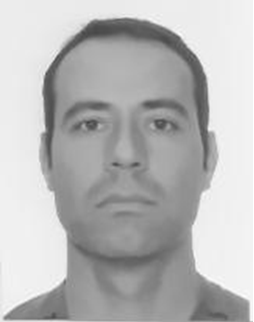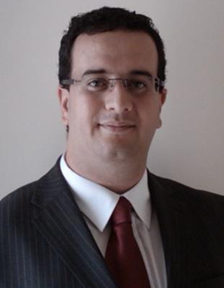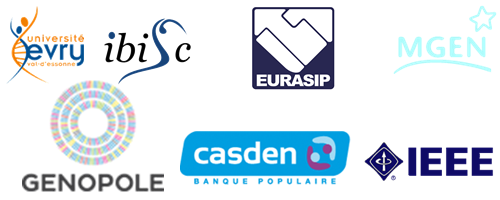
4th International Conference on Image Processing Theory, Tools and Applications
Tutorials will be held on the first day of the conference.
Department:
U2IS-RV / ENSTA-ParisTech, Palaiseau,
FRANCE
E-mail: antoine.manzanera@ensta-paristech.fr
Homepage: http://www.ensta-paristech.fr/~manzaner/index_eng.html
Presentation title: From local descriptors to holistic models: a general framework embedding video processing and object representation.
Abstract:
We present in this talk recent and ongoing works on feature space based image processing and representation models. We choose the multiscale partial derivatives (the local jet) as a basic description of the local geometry. The local jet feature space allows local categorization and provides a similarity based metrics which can be used in many image processing and vision tasks, including: non local denoising, inpainting, optical flow, background estimation and tracking. Furthermore, global geometrical or statistical measures in the feature space provide relevant descriptors of objects, textures, scenes or activities, that revisit from a new perspective several classic themes of computer vision, amongst which: statistical salient structures, dense Hough transforms. Finally, we consider the active vision point of view, assuming that the scene is partially and progressively acquired by a moving sensor, and investigate the model associated to this sparse and dynamic representation.
Short Biography:
Antoine Manzanera received the BS degree in Mathematics (1991) and the MS degree in Theoretical Computer Science (1993) from Université Claude Bernard in Lyon. From 1994 to 1996 he taught Maths, Physics and Biology in middle and high schools in Asución, Paraguay. From 1997 to 2000, he was with Aérospatiale (now MBDA) and Centre Technique d'Arcueil (DGA), doing research on Programmable Artificial Retinas. He received the PhD degree in Signal and Image Processing from Télécom ParisTech in 2000. In 2001, he became Associate Professor at ENSTA-ParisTech. His Research objectives are oriented towards the design of efficient and versatile vision systems considered as a whole, from the mathematical models of images to the embedded implementation. His research interests spread from the visual models of object, texture, or activity, to the parallel vision algorithms, including discrete geometry, video enhancement, motion analysis, and scene segmentation. Regarding teaching activities, he is involved in the 2nd and 3rd year of Engineer degree at ENSTA, and in the Master of Computer Science of Université Pierre et Marie Curie of Paris. International cooperation is an important part of his activity, with many education and research collaborative actions, including Romania, Colombia, Mexico, Brazil, Tunisia and Algeria. He has authored around 50 refeered international publications, and acted as a referee for a number of international conferences and journals, including Pattern Recognition Letters, Journal of Real-Time Image Processing and IEEE Transactions on Image Processing. He is a regular expert for a number of national and international Research funding entities, including ANR and NWO. In 2012, he received the Habilitation (HDR) degree from Université Pierre et Marie Curie, and he is now full Professor at ENSTA-ParisTech.
Department:
University of the West of Scotland,
United Kingdom
E-mail: abbes.amira@uws.ac.uk
Homepage: http://www.uws.ac.uk/staff-profiles/computing/abbes-amira/
Presentation title: Reconfigurable Computing for Imaging Systems
Abstract: This talk will address different software and hardware issues related to the design and implementation of imaging systems using reconfigurable computing. A range of algorithms, including discrete wavelet transform (DWT), Ridgelet and Curvelet transforms will be presented for imaging applications such as medical image denoising, segmentation and compression and biometrics. The implementation process of these algorithms on Field Programmable Gate Arrays (FPGAs) will be described. In addition, the talk will review the latest reconfigurable hardware technologies and development methods for real-time embedded systems, and will conclude with comprehensive case studies demonstrating the deployment of low power reconfigurable architectures for algorithms acceleration and performance evaluation methods for reconfigurable imaging systems.
Short Biography:
Abbes Amira is a full professor in visual communications at the University of the West of Scotland (UWS), UK. Prior to joining UWS, he took other academic positions at the University of Ulster-UK, Qatar University-Qatar, Brunel University-UK and Queen’s University Belfast-UK. He received his Ph.D. in the area of Electronic and Computer Engineering from Queen’s University Belfast in 2001, developing a coprocessor for matrix algorithms using FPGAs for image and signal processing applications. He has been awarded a number of grants from government and industry and has published more than 200 publications in the area of reconfigurable computing, image and signal processing during his career to date. He has successfully supervised 13 PhD students under his supervision. He has been invited to give talks, short courses and tutorials at universities and international conferences and being chair, program committee for a number of conferences. He was one of the tutorials presenters at ICIP 2009, Chair of ECVW 2011, Program Chair of ECVW2010, Program Co-Chair of ICM12, DELTA 2008, IMVIP 2005. He is the general conference Co-Chair for ICM 2014. He is also one of the 2008 VARIAN prize recipients. He has been a PhD external examiner for Trinity College Dublin, Edinburgh, Southampton and many other Universities in UK, Hong Kong and Australia. Prof. Amira was one of the guest editors for the Special Issue in the Pattern Recognition Journal, titled ”Feature Generation and Machine Learning for Robust Multimodal Biometrics”, March 2008. He took consultancy positions with many companies in UK, and he holds a visiting professor position at University of Tunn Hussein Onn, Malaysia. Previously, he was visiting with the University of Nancy, Henri Poincare, France. He is a regular referee for many national and international funding bodies including (EPSRC and QNRF) and he sits on the international advisory boards for some international research centres. He is a Fellow of IET, Fellow of the Higher Education Academy, Senior member of the IEEE, and Senior member of ACM. His research interests include: embedded systems, high performance reconfigurable computing, image and video processing, multi-resolution analysis, biometrics and connected health applications.
![[[http://www.inderscience.com/ijsise]] [[http://www.inderscience.com/ijsise]]](/ipta14/lib/exe/fetch.php?media=ijsise_scoverijsise.jpg)
![[[http://www.elsevier-masson.fr/autres-specialites/irbm-revue/pezrb/]] [[http://www.elsevier-masson.fr/autres-specialites/irbm-revue/pezrb/]]](/ipta14/lib/exe/fetch.php?media=irbm.gif)


